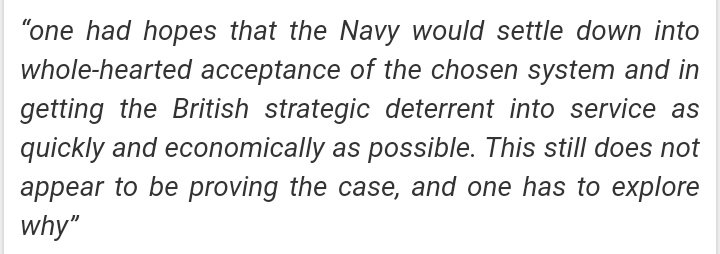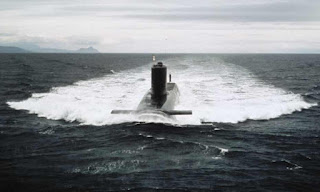Authors 🇮🇳
7 days
30 days
All time
Recent
Popular
Part 2
Lengthy again..
By 1974 the debate focused on whether there was a credible risk of explosion from the liquid fuel, or if this was manageable.
This risk led to the beginning of a major policy debate in the very heart of the secret state about whether this was an acceptable level of risk, or if there were alternative options open to consider.
There appears to have been a difference of opinion between different parts of government on what the right answer was in this case.
To the Royal Navy, charged with delivering the nuclear deterrent mission, the only acceptable answer was to step away from Chevaline and Polaris and upgrade to Poesidon as quickly as possible to maintain the credibility of the deterrent.
By contrast No10 was growing increasingly frustrated with what it saw as an inability by the Royal Navy to focus on delivering a capable SSBN force, & its constant demands to goldplate the solution – in one memo to the Prime Minister from his Private Secretary there is the line:

Lengthy again..
By 1974 the debate focused on whether there was a credible risk of explosion from the liquid fuel, or if this was manageable.
Part 1
— \u2728 (@Aamani_03) November 15, 2021
It's a bit lengthy, just keep reading :)
The British Nuclear Policy In The 1970s. https://t.co/DE1A7e1SQ0 pic.twitter.com/VSuUgpVMk6
This risk led to the beginning of a major policy debate in the very heart of the secret state about whether this was an acceptable level of risk, or if there were alternative options open to consider.
There appears to have been a difference of opinion between different parts of government on what the right answer was in this case.
To the Royal Navy, charged with delivering the nuclear deterrent mission, the only acceptable answer was to step away from Chevaline and Polaris and upgrade to Poesidon as quickly as possible to maintain the credibility of the deterrent.
By contrast No10 was growing increasingly frustrated with what it saw as an inability by the Royal Navy to focus on delivering a capable SSBN force, & its constant demands to goldplate the solution – in one memo to the Prime Minister from his Private Secretary there is the line:

Part 1
It's a bit lengthy, just keep reading :)
The British Nuclear Policy In The 1970s. https://t.co/DE1A7e1SQ0

The British nuclear submarine-based deterrent initially came into service in the late 1960s, providing ultimately 4 ‘RESOLUTION’ class SSBNs, each carrying 16 Polaris missiles, with 3 warheads, intended to deter aggression by the Soviet Union.
The power of the Polaris system was that unlike fixed airfields & other sites, it was practically invulnerable to a first strike attack, & could exist to threaten to wipe out #Moscow & other major Soviet cities if required, even after UK had been obliterated in a nuclear attack.
In theory the UK nuclear deterrent was committed to @NATO – and would be employed alongside other NATO nuclear weapons if called upon as part of an integrated strike which would involve all out nuclear release.
This was the main role for the force, but in addition it could be, in theory, returned to national control and used to conduct a unilateral nuclear strike if British national survival was under threat.
It's a bit lengthy, just keep reading :)
The British Nuclear Policy In The 1970s. https://t.co/DE1A7e1SQ0

This is the TOP SECRET paper from the 1970s, sets out how many nuclear warheads the British Royal Navy thought it could use to destroy Moscow in WW3.
— \u2728 (@Aamani_03) November 14, 2021
Will make a complete thread soon.. pic.twitter.com/gDSK05BgIy
The British nuclear submarine-based deterrent initially came into service in the late 1960s, providing ultimately 4 ‘RESOLUTION’ class SSBNs, each carrying 16 Polaris missiles, with 3 warheads, intended to deter aggression by the Soviet Union.
The power of the Polaris system was that unlike fixed airfields & other sites, it was practically invulnerable to a first strike attack, & could exist to threaten to wipe out #Moscow & other major Soviet cities if required, even after UK had been obliterated in a nuclear attack.
In theory the UK nuclear deterrent was committed to @NATO – and would be employed alongside other NATO nuclear weapons if called upon as part of an integrated strike which would involve all out nuclear release.
This was the main role for the force, but in addition it could be, in theory, returned to national control and used to conduct a unilateral nuclear strike if British national survival was under threat.
Indian Americans at NASA
What % of Indians are working with NASA? If you think it's 36% then you're wrong.
#NASA has roughly 1% of Indian origin scientists.
Source: https://t.co/2q9nftFqXd https://t.co/18YwCElyU3

The important point to note here is, these scientists are in leading positions at NASA!
Bhavya Lal was the seniormost White House appointee and Acting Chief of Staff at NASA for the first 100 days of the #Biden Administration.

Currently Bhavya Lal is Senior Advisor for Budget and Finance.
Link:
Remember US sent a Rover to Mars recently? The tougher task was to land it on the surface and Swati Mohan, an Indian origin scientist was leading the team!
Link: https://t.co/vDiMAy2KDU
And remember our mission Chandrayaaan 2? The tougher task was to land and we failed it in.
So do we really need to be proud of these brilliant Indian origin scientists working abroad? NO!
USA is successful, science is doing wonders, that's all great but India is losing skilled and brilliant minds!
What % of Indians are working with NASA? If you think it's 36% then you're wrong.
#NASA has roughly 1% of Indian origin scientists.
Source: https://t.co/2q9nftFqXd https://t.co/18YwCElyU3

The important point to note here is, these scientists are in leading positions at NASA!
Bhavya Lal was the seniormost White House appointee and Acting Chief of Staff at NASA for the first 100 days of the #Biden Administration.

Currently Bhavya Lal is Senior Advisor for Budget and Finance.
Link:
Remember US sent a Rover to Mars recently? The tougher task was to land it on the surface and Swati Mohan, an Indian origin scientist was leading the team!
Link: https://t.co/vDiMAy2KDU
And remember our mission Chandrayaaan 2? The tougher task was to land and we failed it in.
So do we really need to be proud of these brilliant Indian origin scientists working abroad? NO!
USA is successful, science is doing wonders, that's all great but India is losing skilled and brilliant minds!

















